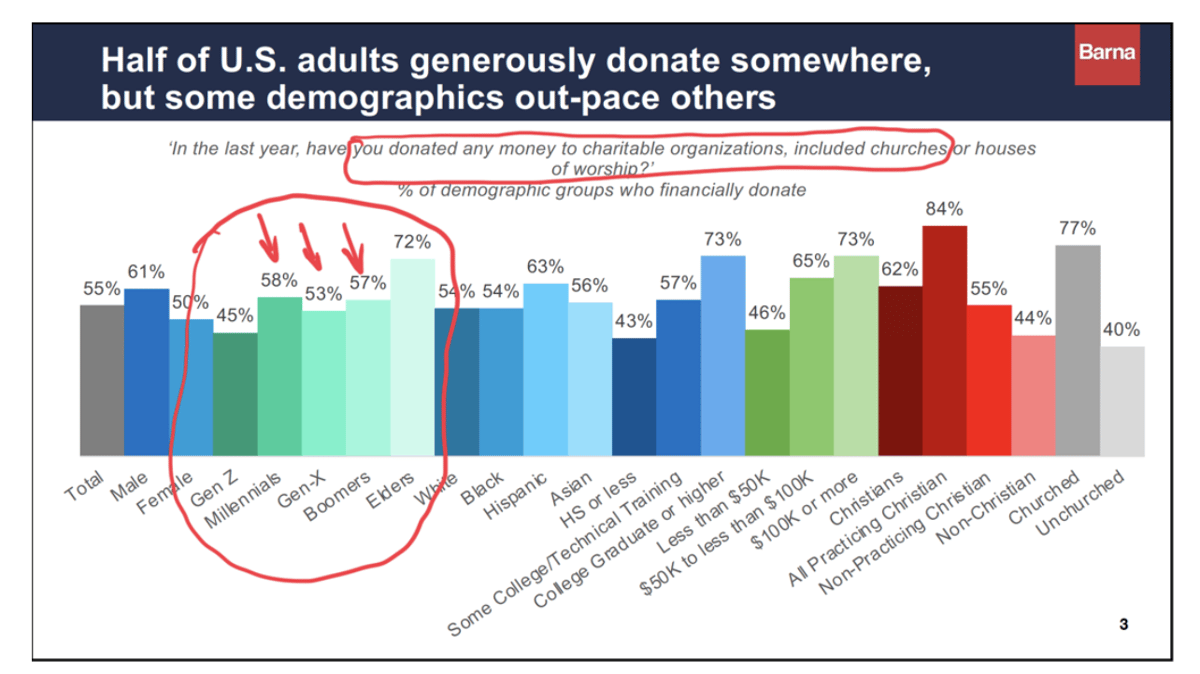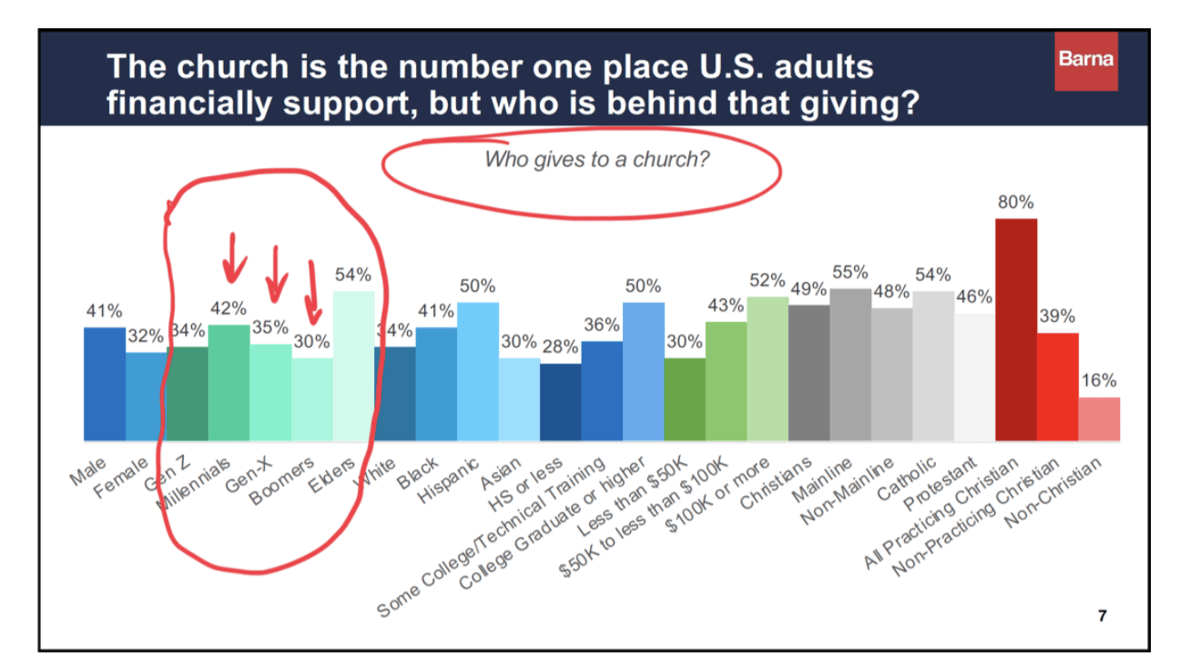What Millennials and Gen Z Can Teach Boomers About Church Giving
Millennials and Gen Zers are often described as the "Me" generations, focused on individualism and personal fulfillment. There is a common belief among some church leaders that these generations are not great givers, particularly church giving. Or, even if they do give, they prefer to give to non-profits and instead of giving to a church.
In 2022, Barna released one of the most comprehensive research reports on generosity in the American church recently (https://www.barna.com/state-of-generosity/). The report offers an incredible amount of insight into the giving landscape. The report included a survey of over 2,000 adults across the United States, asking about their charitable giving practices.
The survey found that, in general, people are still giving to churches, with 69% of all adults saying they had donated to a church or house of worship in the past year.
Stats on Church Giving Might Surprise You
But what about younger generations? Do they give to churches at the same rate as older generations? The answer might surprise you.
Contrary to the popular perception, the Barna data indicates that Millennials and Gen Z actively participate in church giving at rates higher than previous generations.
This is consistent with what I see and hear as I spend considerable time with Millennials and Gen Z, including some of the best and brightest young leaders in the church today. I am in rooms with hundreds of younger church leaders, and what I hear consistently is a love for the church. And a desire to be generous givers to God’s work in the church and beyond.
Two slides from the Barna data jumped off the page at me.
The first one, shown below, asks whether a person has donated to charitable organizations, including churches or houses of worship, in the last year. I zeroed in on the generational giving participation. Note that among Millennials (58%), Gen X (53%), and Boomers (57%), the participation rate is about the same.
(Note: I am excluding Gen Z from the comparison because they are just starting to enter the workplace.)

Not surprising, you might say. “I’m not surprised Millennials give. But they don’t give to the church.” Okay, fair enough.
Let’s look at the next slide. This one asks, “Who gives to a church?”
Note the significant disparity among Millennials (42%), Gen X (35%) and Boomers (30%). It is not what you are probably expecting. The participation rate for Millennials is 12 percentage points HIGHER than Boomers.

Do you see that? Millennials participate in giving to churches at a significantly higher rate than Boomers. And most church leaders thought it was the opposite.
I know you’re probably thinking, “Well, Boomers give more money than Millennials.” That might be true, but that’s not a fair comparison. The age and stage are entirely different. Younger givers generally don’t make as much as their older counterparts. And they also have more family obligations.
What matters is the participation rate—the affinity for giving. And the perception that Millennials don't like giving to the church is false.
Do You Make it Easy to Participate in Church Giving?
So, the question you might ask as a church leader is, perhaps, “What do I do with this?” You’re saying the younger generations are inclined to be generous with the church, but that’s not what I see at our church.
There is a good chance that your messaging and communications are off. In other words, it needs to be fine-tuned for the younger generations. They hear it but do not fully comprehend it in a way that would cause them to respond.
Three Suggestions to Increase Church Giving
1. Emphasize the Impact of Their Giving Millennials and Gen Z are known for their desire to make a difference and positively impact the world. In all likelihood, your church is making a big difference in the community and beyond. But they don’t know it.
When it comes to church giving, it's important to emphasize how their contributions make a difference in their community and beyond. Share stories and examples of how the church uses its giving to make an impact, especially if specific projects or initiatives appeal to younger givers.
2. Provide Multiple Ways to Give Millennials and Gen Z are known for their comfort with technology and desire for convenience. Providing multiple ways for them to give, including online giving, text-to-give, and mobile apps can make giving more accessible and convenient for them.
Many churches got a lot better at this during the pandemic. But there is still much room for increasing engagement levels, especially in having an easy and user-friendly process. A complicated or confusing giving process can be a barrier for younger generations, so ensure the process is streamlined and straightforward.
3. Make church giving a part of worship. Incorporating giving into the worship experience is a powerful way to engage all generations in church giving, especially younger givers. During the pandemic, when churches were not meeting in person, the giving moment before the morning offering disappeared.
Having a giving moment in worship every week is essential to developing the spiritual aspect of giving. That is, financial discipleship. We give not for the church budget, but because of our great need to give in response to what God has done for us.
Teach regular, small lessons on biblical giving. Tell stories of impact. And emphasize trust — when you give here, you can trust that we are stewarding your gifts well. In other words, make giving a meaningful part of the worship experience.
Developing younger givers can be a significant experience in your church. As you do so, embrace what the Apostle Paul said in Philippians 4:17. “Not that I desire your gifts; what I desire is that more be credited to your account.” It is what we want FOR you, not what we want FROM you.
I hope these ideas will help you.
As always, if you want to have further conversation, please feel free to drop me an email at jim@generis.com.
Get Under The Hood of Your Giver Data with a
FREE Generosity Pulse Report
The Generosity Pulse Report offers a snapshot of the health of your generosity and stewardship culture. By assessing the long-term health of your church’s giving and providing a clear view of your current finances, the Generosity Pulse Report eliminates the guesswork and offers your team confidence and understanding of your financial reality.
Schedule Your FREE Generosity Pulse Report Today

Share this
You May Also Like
These Related Stories
.png)
5 Essential Tips for Planning a Major Giving Initiative

Prioritize Giving with Your Church Community


No Comments Yet
Let us know what you think